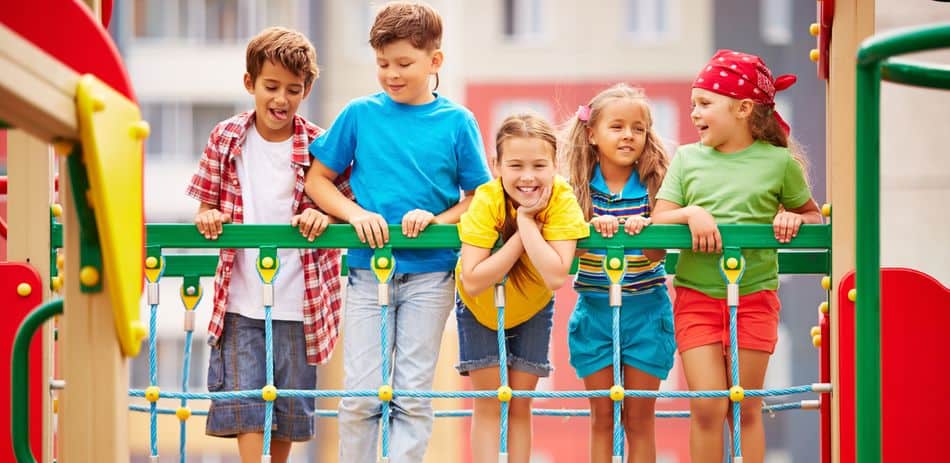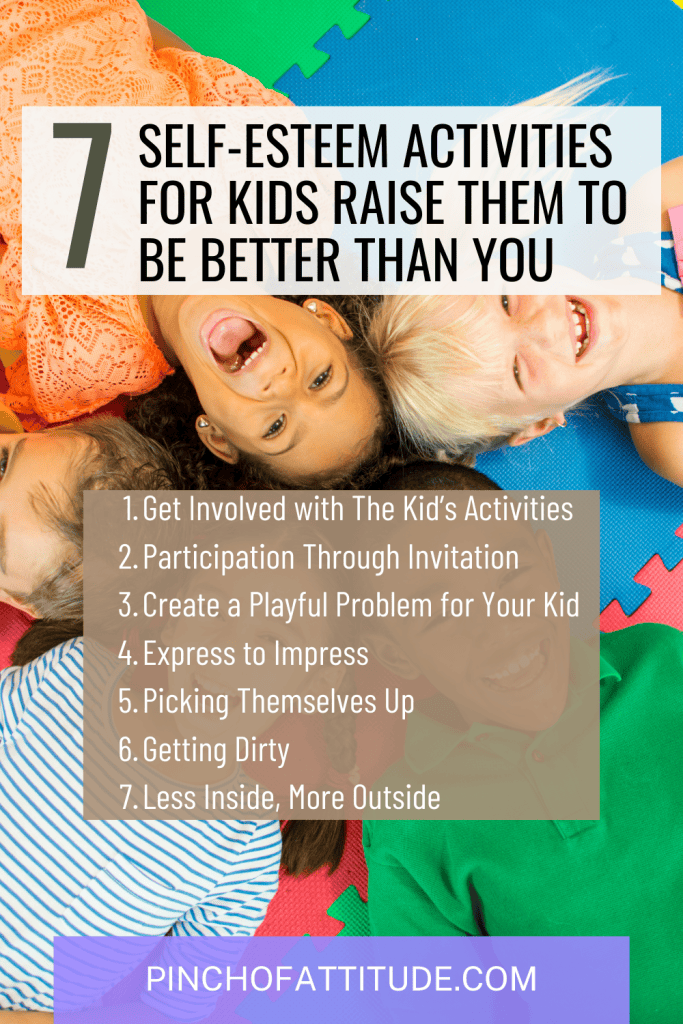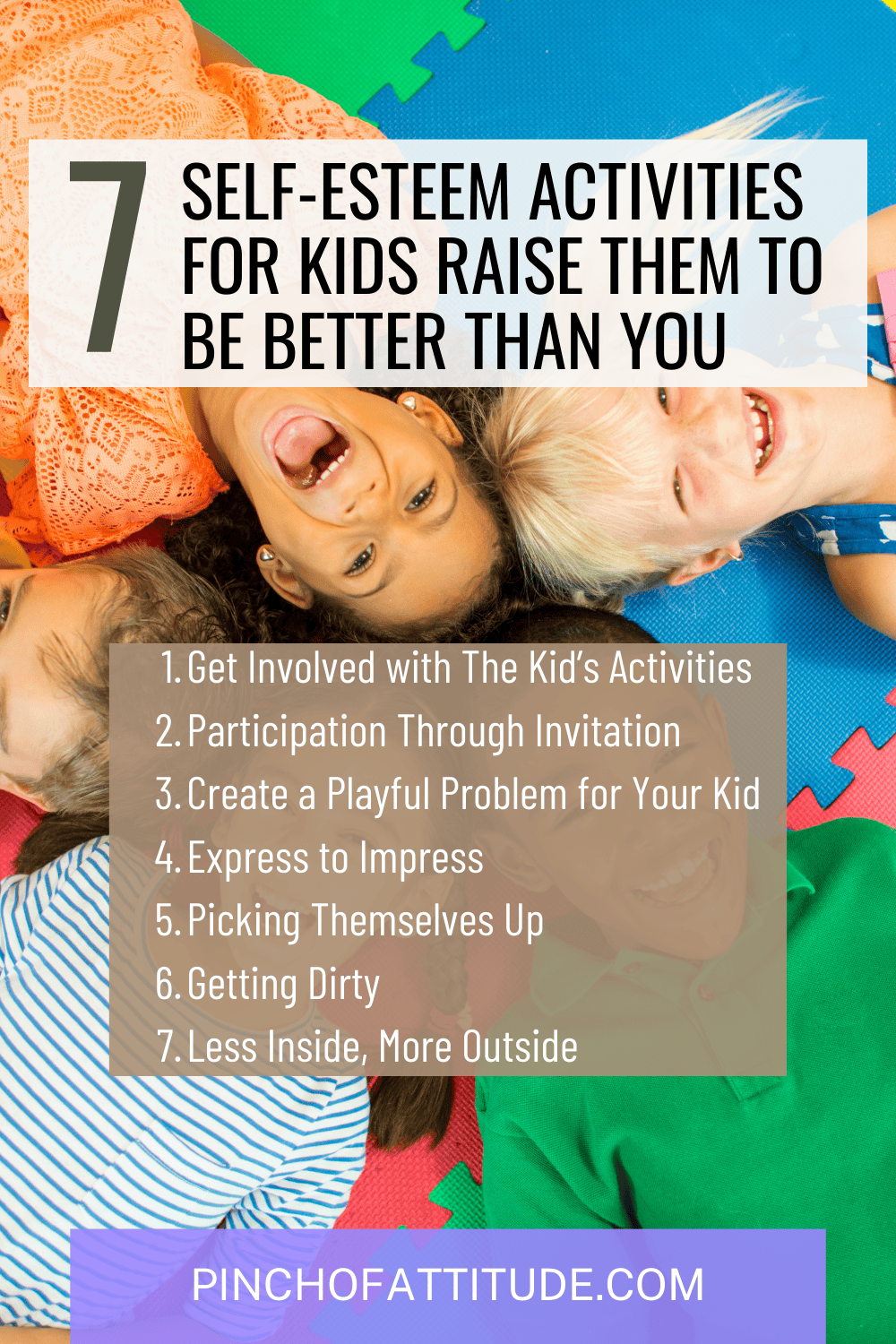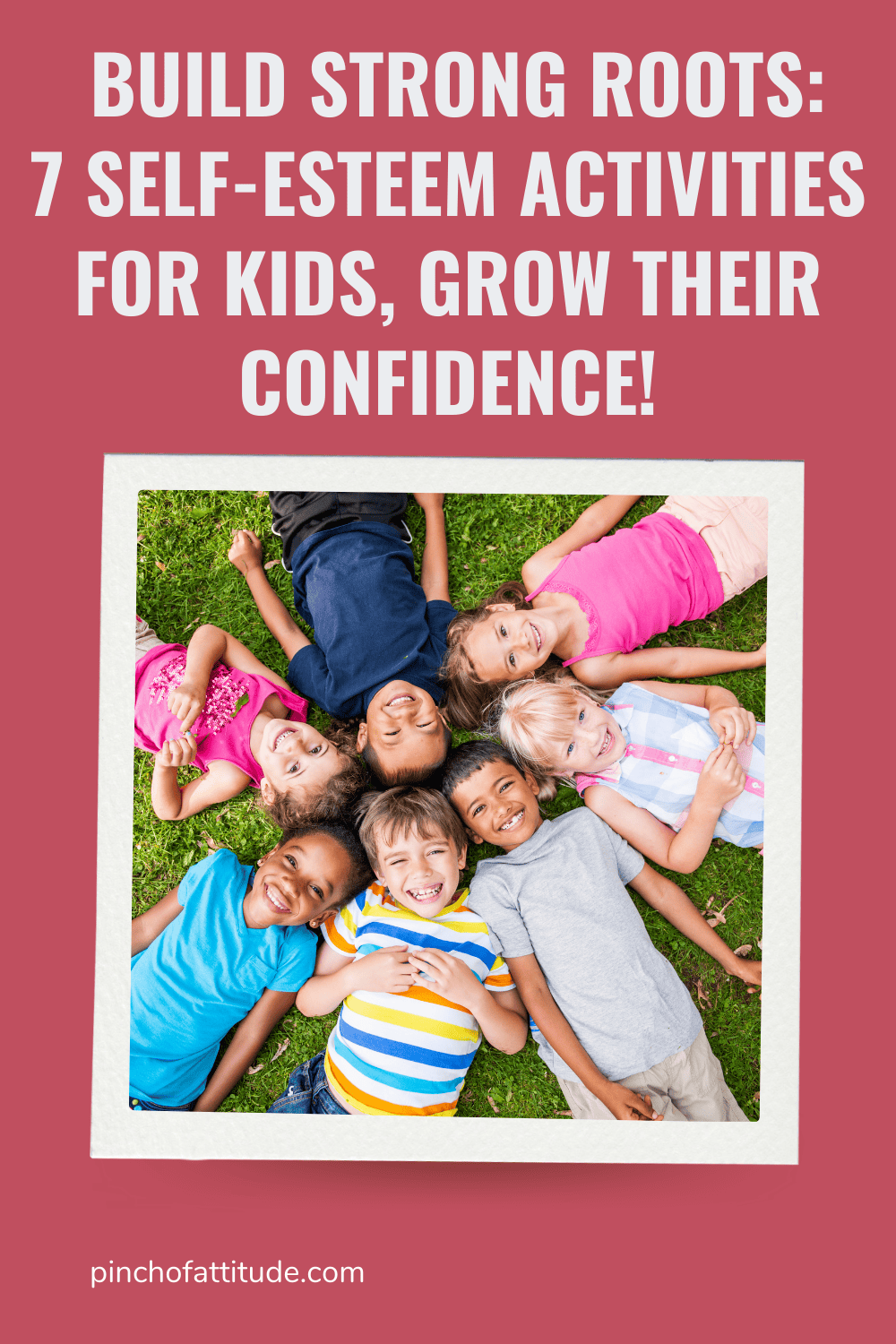Growing up, I didn’t have a good relationship with my mom and as a result, I was often overlooked. Though I felt lost and confused most of the time, I never chose to feel bad for myself and was very determined to find ways to shape my mind and raise my confidence.
Kids’ minds are like a sponge, whatever they see or hear, they will repeat. Though the world around them might look awfully more terrifying, complicated, and overwhelming as long as they have you to look up to, they’re ready to feel safe.
Watching my friends and their interactions with their kids in different environments taught me many lessons and self-esteem activities for kids that are worth sharing with parents out there so their children don’t have to experience what I went through as a kid.
We know that people with high self-esteem and self-confidence are happy and fulfilled thus allowing them to help and lead others to success. Thus I’m sure that’s what you want your kids to grow up to be.
“Is it even possible?” you might ask. With these self-esteem activities for kids, it is certain.
Table of Contents
1. Get Involved with The Kid’s Activities

Kids who have healthy self-esteem tend to think good things about themselves. They feel prepared for everyday challenges simply because they feel confident that they can do what is expected. These are the kids who feel valued and accepted by their parents and their friends and feel proud of a job well done.
Kids with low self-esteem doubt their ability to do well at things. They showcase no confidence but feel self-critical and are always too hard on themselves. Since insecurity and doubt are their worst enemies, they often compare themselves with other kids only to decide that they are good for nothing.
It is confusing for them as little people, just as much as it is terrifying for you as a parent.
So, let’s start by building their confidence first.
Confidence is the feeling or belief that “one can have faith in or rely on someone or something”. It is directed towards one’s self but also involves confidence in others. If you’ve noticed that your kid lacks confidence in his or her own abilities, then it might be that they lack confidence in you or their friends.
Your kids will start building confidence and accepting themselves when they start feeling confident in and accepted by others. It is on you as a parent to praise their good behavior, to help them when needed, and to always be supportive. Show interest in what they do, and get involved in their activities.
By doing all that, you’ll encourage them to play with other kids, but you’ll also give them a safe zone to return to. One step at a time, they’ll become comfortable enough in their own skin to make new friends, while true friends will help them gain confidence in both other people and themselves.
2. Participation Through Invitation

Healthy self-esteem plays an incredibly important role in a child’s development. Self-confidence and self-acceptance stem from positive feelings about themselves and the world around them. When they feel good about both, they face challenges with no fear, cope with their mistakes, and thrive in what they do.
Most importantly, they are then proud of their abilities and accomplishments, which makes them even more confident in return. Confident kids grow without any stress or anxiety, even though they learn important lessons on failure and success at each new milestone. But, it all takes time and practice.
A child’s self-esteem cannot be developed overnight, so don’t worry and take action. Help your kid learn new things, focus on strengths instead of weaknesses, recognize and praise their effort, and ban harsh criticism. Self-esteem activities for kids require a parent’s initiative, so show them how to act.
Whatever you do, be a good role model.
Set a good example where they can see it and understand what it means. Start with everyday tasks, put an effort into what you do, and try to do it cheerfully. Teach them that there’s no success without trying and that trying often implies failure. It has nothing to do with our abilities or our self-worth, after all.
If your kids are too shy to befriend their classmates or neighbors, befriend their parents to show your children that there’s nothing to feel unconfident or worried about. Invite them to participate in activities with other kids, and to interact with people who are just as good at being role models as you are.
3. Create a Playful Problem for Your Kid

Still, it’s not only a secure relationship with parents and peers that helps instill confidence in kids. Your young ones should be allowed to try new things on their own too, which will make them explore and discover their intellectual potential and gain confidence in their abilities to succeed in school as well.
A child’s self-esteem benefits from creative problem-solving activities in so many ways. First, these activities allow them to be a part of a team, play with other kids, and advance by their side. Sometimes, the children they solve problems with will challenge them to be better and to reach farther.
Other times, your kids will be the ones challenging other children to do the same. They will realize not only that they possess unique abilities to solve problems in a creative way, but also that they have something valuable to offer to their team. Both will boost their self-belief and improve their self-image.
If they experience anxiety while communicating with other kids, attractive, mind-bending, and intellectually stimulating games will trigger their interest, and make them forget their feelings of difference and uneasiness. It won’t be long before they let their fears aside and enjoy playing with others.
So, invite some kids over, and propose a game of wool webs. Scavenger hunts, impromptu skits, Legos, and puzzles are just as exciting and intellectually challenging. All group problem-solving activities are brilliant for self-esteem building, given that they spark creativity and encourage collaboration.
4. Express to Impress

Though all problems require suitable solutions, emotional ones are often far more delicate and harder to solve. Whether we’re talking about confusion, insecurity, self-isolation, or some other manifestation of low self-esteem, these are not problems that your kids can solve without your help.
Another problem is, you won’t be able to help them if they refuse to talk. When it comes to emotional problem-solving, communication is crucial. It can be said that expressing is the number one of all self-esteem activities for kids.
Just like adults, children with low self-esteem have difficulties expressing their feelings, either because they are too ashamed, or because they simply don’t know how. It’s on you to encourage them to talk by creating a comfort zone in which they would never feel judged or criticized.
Psychology Today offers some practical tips for doing so. If asking directly or giving them space doesn’t do much, then you need to get creative. Show them that you understand their struggles by relating to the emotional situation they are in. Share your own experience, or simply borrow one.
Here’s a great example of sharing borrowed experiences, and a handy trick for any parent – use their favorite fictional characters. For instance, you can ask: “Do you remember when Harry Potter was sad and didn’t talk to Ron and Hermione for weeks?” and then continue with: “Do you feel like that?”
This will allow you to approach them on their own terrain, and give them something they can identify with. The comfort zone will be established, and so will an atmosphere of trust and honesty. Your kids will then know that it’s safe to open up and address the emotional problems that don’t know how to solve.
5. Picking Themselves Up

Even though a little disappointment can actually benefit a developing child, kids with low self-esteem tend to take failures very seriously. As a parent, a pedagogue, and their confidante, you should teach them how to pick themselves up afterward, and how to cope with failure for the rest of their lives.
Failures themselves, just as well as the fear that ensues from them may severely damage your kids’ confidence, their willingness to try new things, and their abilities to succeed in different areas of life. The fear of failure is paralyzing – it prevents us from bouncing back and inhibits our potential and ambition alike.
You need to prepare your young ones for failure by teaching them to learn from their mistakes.
While I don’t personally believe in the didactic power of participation trophies, some kind of reward for trying hard can go a long way. Be careful, though – a child needs to know the difference between succeeding and failing, which is why a reward should always be followed by a conversation about the value of effort.
Once again, approach them at their own terrain. Ask them how much they remember about Albert Einstein from their school lectures and tell them what the greatest scientists of all times said: “I think and think for months. For years. Ninety-nine times the conclusion is false. The hundredth time I am right”.
This is a nice quote to begin a lesson on failures and to illustrate how every mistake is a great way to learn. Take time to explain that everyone has different talents, and to encourage your kids to pursue what makes them unique. Never pressure children to be something they don’t want or cannot become.
Also, never keep them under a glass bell. Instead, always introduce them to new activities and let them make mistakes. Stand by their side at the beginning – moms can invite them to cook together, while dads can mentor them in fixing things around the house. If they fail, encourage them to try again.
6. Getting Dirty

At your kids’ age, every activity is an important educational opportunity. As long as you don’t pressure them, feel free to enroll them in classes, creative workshops, and sports that teach various skills. This will give them a chance to discover what they like and allow you to explore what they are good at.
Once you notice particular strengths that your little ones possess, you can use them to boost their self-confidence. Get dirty and cheat a little – create scenarios in which your kids can showcase their unique abilities, and feel their confidence raising as they teach and help others to develop the same skills.
For example, if your kids have the potential to be the next football starts, invite children from the neighborhood and start a little league in your family backyard. Since they will enjoy being the best among their peers, it’s important to teach them not to brag but to share their knowledge with other kids.
Whether it comes to volunteering time or to contribute to the greater good, helping others always improves self-esteem. It changes mindsets in both children and adults by encouraging positive thinking and an attitude of respect and gratitude towards one’s abilities and others’ needs, all at the same time.
7. Less Inside, More Outside

A little football league is even greater if it takes place on an open field beyond the borders of your urban neighborhood. In fact, all self-esteem activities for kids are twice as beneficial when they are organized under the open sky, in a little greenwood on the outskirts of your city, or in a blooming meadow nearby.
If you want to raise healthy and confident children, you simply cannot rely on digital devices to do that on your behalf. Letting them play video games in front of your TV screen where you can keep an eye on them while doing chores is easy, but parenthood is hard. It requires more commitment and creativity.
So, reschedule a few meetings, and take your kids out.
As Angela Hanscom, a pediatric occupational therapist, notes, taking kids outside to play comes with a host of confidence-boosting benefits.
“Outdoor play will foster confidence because the more they take risks, [the more] they’re able to overcome them, which is best done outside because you’re allowed to jump off things and spin in circles and have more room to move”, Angela explains. If you consult your inner child, you’ll find this to be true.
Self-esteem is about mental health, which asks for a healthy lifestyle too. “In the meantime, you’re also strengthening your muscles and improving your balance. Those things are going to improve your confidence because you’re going to be stronger and more capable when you navigate your environment”.
Related Posts:




